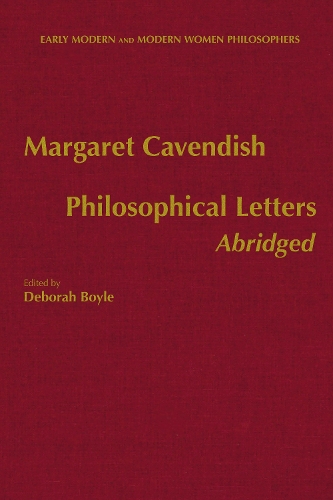
Philosophical Letters, Abridged
(Hardback)
Available Formats
Publishing Details
Philosophical Letters, Abridged
By (Author) Margaret Cavendish
Edited by Deborah Boyle
Hackett Publishing Co, Inc
Hackett Publishing Co, Inc
21st October 2021
United States
Classifications
Tertiary Education
Non Fiction
Philosophy of science
192
Physical Properties
Hardback
296
Width 152mm, Height 228mm
532g
Description
"Margaret Cavendish (16231673) is a fascinating figure who is getting increasing attention by historians of philosophy these days, and for good reason. . . . She's an interesting advocate of a vitalist tradition emphasizing the inherent activity of matter, as well as its inherent perceptive faculties. She's also the perfect character to open students (and their teachers) up to a different seventeenth century, and a different cast of philosophical characters. This isan ideal book to use in the classroom.The Philosophical Letters(1664) gives us Cavendish's view of what was interesting and important in the philosophical world at that moment, a view of philosophy as it was at the time by an engaged participant.There are few documents like it in the history of philosophy. Deborah Boyle's Introduction provides a very accessible summary of Cavendish's natural philosophy, as well as good introductions to the other figures that Cavendish discusses in the book. Boyle's annotations are not extensive, but they are a great help in guiding the student toward an informed reading of the texts."
-Daniel Garber,Princeton University
Reviews
"Boyles new edition of CavendishsPhilosophical Lettersmakes accessible in print this imagined correspondence between Cavendish and another woman about how Cavendishs view compares to those of Descartes, Hobbes, More, and Van Helmont. Boyles excellent Introduction sets the work in its context with respect to modes of writing and the intellectual environment in which she wrote, to Cavendishs philosophical system as it is developed across her writings, and to the views of those thinkers against which she positions herself.This edition is both scholarly and accessible. It will be valuable to those already familiar with Cavendish, and especially valuable to those just starting to incorporate Cavendish into their understanding of early modern philosophy.
Lisa Shapiro,Simon Fraser University
Boyle argues, and succeeds in making the case, that the Letters can be read on their own and stand as a single work (not a scattered series of thoughts).This will almost certainly become the standard volume of Cavendish'sLetters."
Stephen Barbone,San Diego State University
Author Bio
Deborah Boyleis Professor of Philosophy, College of Charleston.
